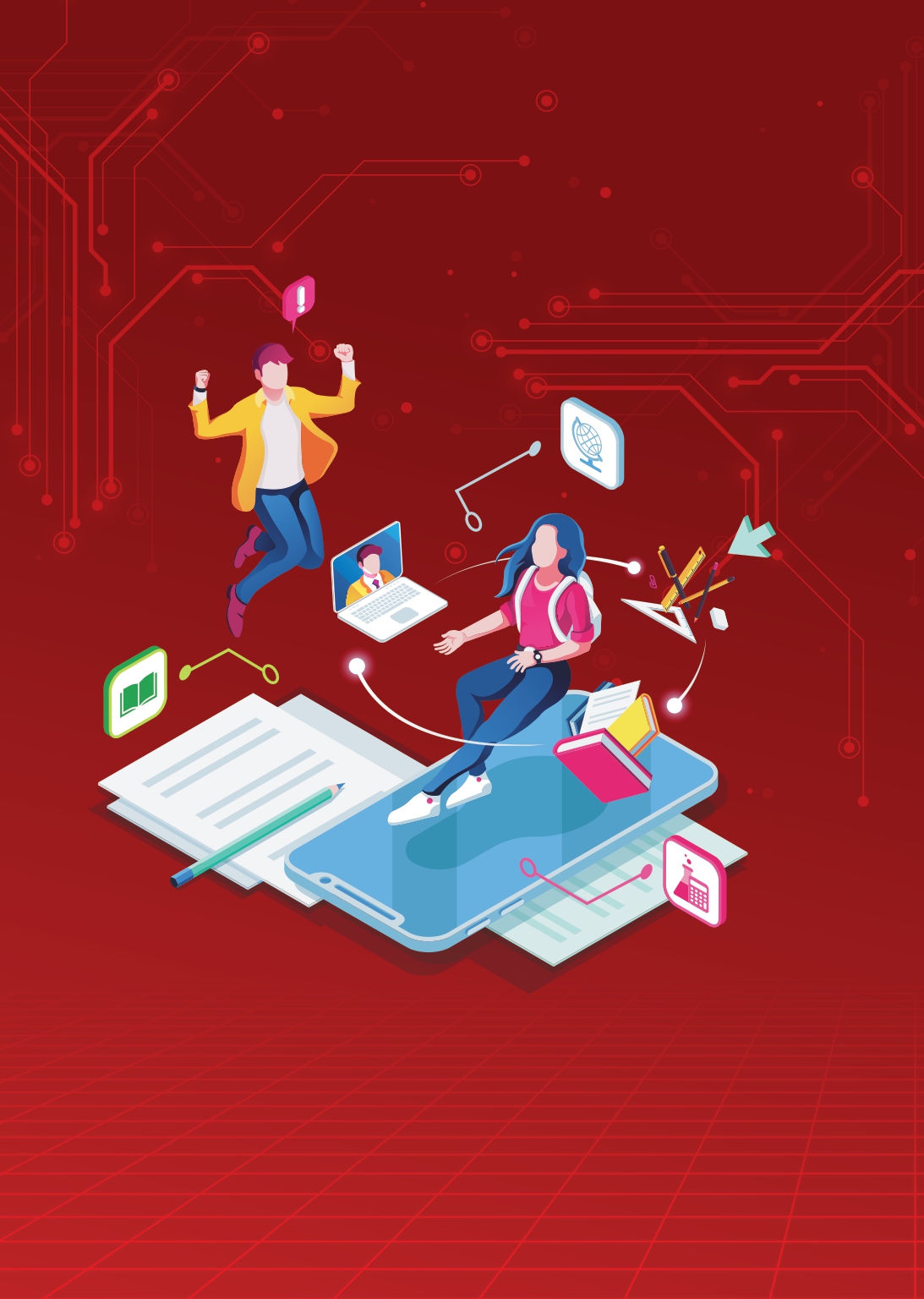Developing Learning Skills for Digital Citizenship
Keywords:
Digital citizenship, Learning, Digital literacy, Digital intelligent quotientAbstract
Digital intelligence is one of the 21st century’s essential skills. To achieve the digital citizenship, digital intelligence needs to be developed so that people can earn their living and have good quality of life. This article aims to study the learning skills and digital intelligence, which are the foundation of digital citizenship, among Thai people in order to review the roles of the NBTC and the NBTC Office in encouraging digital citizen to drive Thailand forward. Suggestions were also proposed in a bid to forge the digital citizenship in Thailand. From reviewing academic documents and researches both in Thailand and from overseas, it was found that in order to be a smart digital citizen with digital literacy, and to achieve the digital intelligence quotient, eight skills need to be developed, namely, digital citizen identity, screen time management, cyberbullying management, network security management, privacy management, critical thinking, digital footprint, and digital empathy. The roles of the NBTC and the NBTC Office were to educate, set up policies, and create guidelines for consumer protection on a continual basis in order to move Thailand forward with digital citizenship. An appropriate use of digital technologies in learning and education would set a standard of smart and safe use of technologies for innovative creation.
References
กระทรวงยุติธรรม. (2563). อาชญากรรมทางไซเบอร์ ภัยคุกคามจากวิถีใหม่ยุคโควิด-19 ผู้เชี่ยวชาญแนะรัฐเร่งให้ความรู้. https://www.moj.go.th/view/45017
ฉัตรพงศ์ ชูแสงนิล. (2561). ยุคแห่งพลเมืองดิจิทัล. คลังความรู้ SciMath. https://www.scimath.org/article-technology/item/8659-2018-09-11-07-58-08
ฉัตรพงศ์ ชูแสงนิล. (2562). ความฉลาดทางดิจิทัล (Digital intelligence). คลังความรู้ SciMath. https://www.scimath.org/article-technology/item/10611-digital-intelligence
ฐิตินัน บุญภาพ คอมมอน. (2556). บทบาทของสื่อใหม่ในการสร้างค่านิยมทางสังคมและอัตลักษณ์ของเยาวชนในเขตกรุงเทพมหานคร. กรุงเทพฯ: คณะนิเทศศาสตร์ มหาวิทยาลัยธุรกิจบัณฑิตย์.
ธนวัฒน์ เจริญษา และสุภาณี เส็งศรี. (2563, กรกฎาคม–ธันวาคม). ความฉลาดทางดิจิทัลกับทักษะการเรียนรู้และนวัตกรรมในศตวรรษที่ 21. วารสารวิจัยและนวัตกรรม, 3(2). https://so06.tci-thaijo.org/index.php/ivebjournal/article/view/245251
บุญชนก ธรรมวงศา. (2561). 4CS : สี่ทักษะการเรียนรู้ที่ควรมี ฝึกกันได้ และไม่ต้องใช้พรสวรรค์. The Potential. https://thepotential.org/2018/10/19/4cs- for-21stcentury-learning/.
พักตร์วิภา โพธิ์ศรี. (2561). บทบาทการศึกษาต่อการพัฒนาความเป็นพลเมืองดิจิทัล. วารสารการศึกษาและการพัฒนาสังคม, 14(1), https://edu.buu.ac.th/vesd/a2561-1.pdf
ยืน ภู่วรวรรณ. (2564). ความฉลาดรู้ดิจิทัล (DQ Digital- Quotient). ชีวิตวิถีใหม่และความฉลาดทางดิจิทัล. https://learningdq-dc.ku.ac.th/course/?c=5&l=5
ศุภณัฐ เพิ่มพูนวิวัฒน์, ศรัณยุ หมั้นทรัพย์, และจารุวรรณ แก้วมะโน. (2564). ความเป็นพลเมือง : บทสำรวจสถานะความเป็นพลเมืองกับการรู้ดิจิทัล. สำนักส่งเสริมการเมืองภาคพลเมือง สถาบันพระปกเกล้า. https://www.kpi.ac.th/knowledge/research/data/1194?page=3
สรานนท์ อินทนนท์. (2563). ความฉลาดทางดิจิทัล (DQ Digital Intelligence). มูลนิธิส่งเสริมสื่อเด็กและเยาวชน (สสย.). http://cclickthailand.com/fact-sheet-ความฉลาดทางดิจิทัล-dq-digital-intelligenc/
สุภิญญา กลางณรงค์ และณภัทร เรืองนภากุล. (2564). ความเป็นพลเมืองยุคดิจิทัลกับการรับมือด้านมืดออนไลน์ในวิถีปรกติใหม่. ห้องสมุดงานวิจัยมหาวิทยาลัยแม่โจ้. https://librae.mju.ac.th/acticleDetail.aspx?qid=1198
สุวรรณี ไวท์, สุวัฒสัน รักขันโท, และสิริวัฒน์ ศรีเครือดง. (2564). มนุษย์กับความเป็นพลเมืองดิจิทัล Human : Digital Citizenship. วารสาร มจร มนุษยศาสตร์ปริทรรศน์, 7(2), https://so03.tci-thaijo.org/index.php/human/article/download/252744/171896/942885
Buchanan, R. (2018). How to help children build a positive presence online. World Economic Forum. https://www.weforum.org/agenda/2018/01/why-children-should-be-taught-to-build-a-positive-online-presence
DQ Institute. (2017). Digital Intelligence (DQ): A Conceptual Framework & Methodology for Teaching and Measuring Digital Citizenship. https://www.dqinstitute.org/wp-content/uploads/2017/08/DQ-Framework-White-Paper-Ver1-31Aug17.pdf

Downloads
Published
How to Cite
Issue
Section
License
Copyright (c) 2022 NBTC Journal

This work is licensed under a Creative Commons Attribution-NonCommercial-NoDerivatives 4.0 International License.
The Office of the NBTC holds the copyright of articles appearing in the journal. The Office of the NBTC allows the public or individuals to distribute, copy, or republish the work under a Creative Commons license (CC), with attribution (BY), No Derivatives (ND) and NonCommercial (NC); unless written permission is received from the Office of the NBTC.
Text, tables, and figures that appear in articles accepted for publication in this journal are personal opinion and responsibility of the author, and not binding on the NBTC and the Office of the NBTC. In case of errors, each author is solely responsible for their own article, and not concerning the NBTC and the NBTC Office in any way.


